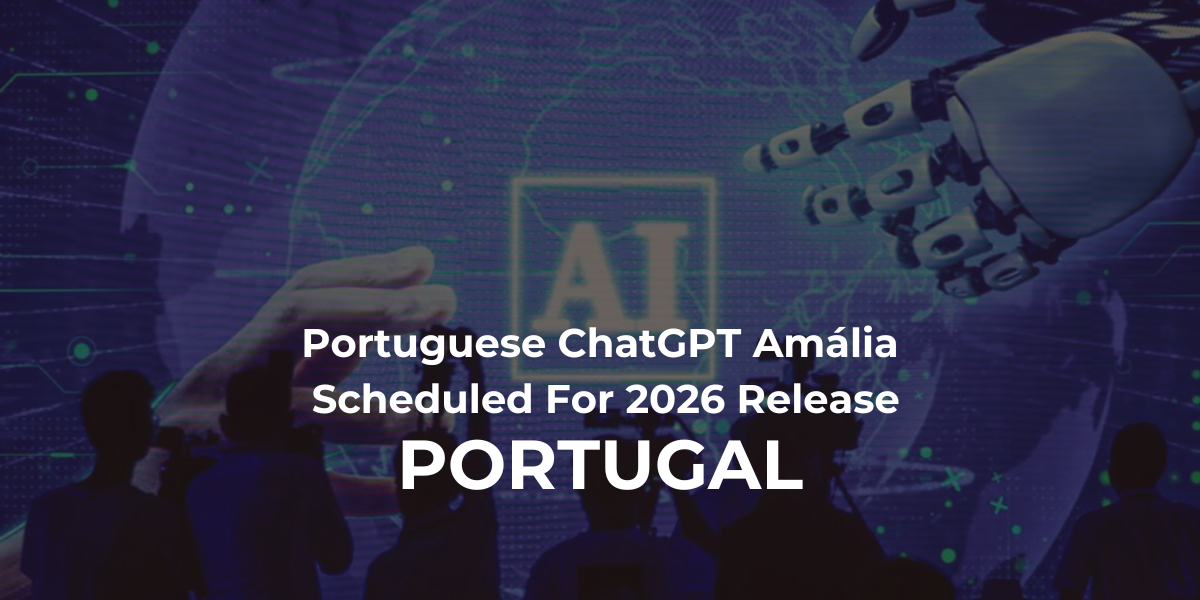The Portuguese large language model (LLM) for artificial intelligence (AI) will be named Amália, with its final version set to launch in 2026, according to the CEO of the Center for Responsible AI in an interview with the media.
Read More About: Local Residents Protest Against Factory Under The Name ‘The Neighbours of the Factory’
On November 11, at the opening night of the Web Summit, the Prime Minister announced the launch, in the first quarter of next year, of an LLM (Large Language Model) in Portuguese.
Collaboration And Development
The project is a collaboration between the Center for Responsible AI, led by CEO Paulo Dimas, and the research centers Nova FCT and Instituto Superior Técnico.
The initial version will not be perfect, but rather a beta—an early version to gather feedback and improve over time, says Paulo Dimas. He also noted that the project spans 19 months. He adds that, the final version will only be released in 2026.
Key Project Focus Areas
The project focuses on three key aspects: the linguistic variant—European Portuguese—cultural representation, and data protection, he emphasizes.
Paulo Dimas highlighted that, as Luís Montenegro mentioned, the project will be ready in the first quarter of 2025. He said:
“We will be building on work already developed by these research centers: therefore, there is work from several years ago in this area, both in the area of data for the Portuguese language, work done by the research center of the New Faculty of Sciences and Technology (FCT), there is also work done within the scope of Técnico and there is also work that will be transferred from Unbabel’s side, due to all the experience that the technology company has in creating multilingual models and models that are currently being trained on supercomputers.”
In short, Paulo Dimas emphasizes that the team working on creating this LLM has many years of experience in this area.
Leveraging Existing Research And Technology

Building on this experience, Paulo Dimas notes that it is possible to deliver this LLM in the first quarter.
He also highlighted the close collaboration with the Foundation for Science and Technology, which has provided the necessary computing infrastructure—essential for large-scale models like this one.
He added:
“And the Foundation for Science and Technology has been investing in computing capacity that will be used here since in practice we will use (…) a computer that is in Barcelona, but part of it is Portuguese. We have a Portuguese computer that is physically located in Barcelona, but a percentage of it belongs to the Portuguese State.”
The CEO of the Center for Responsible AI explained that:
“Now, if we were training this, for example, in a Microsoft, Google or Amazon cloud, this would have a very high cost, but as we will be using this national resource, it will be done in a much more efficient way from a financial point of view.”
When asked what the Portuguese LLM means to him, Paulo Dimas describes it as a key piece in the national artificial intelligence ecosystem.
Paulo Dimas highlighted:
“On top of this LLM it will be possible to create new artificial intelligence applications where the Portuguese language is preserved, where we have control over the Portuguese language.”
Example Of Impact: Halo Project
Paulo Dimas, also vice president of innovation at Unbabel, gave the example of Halo, a product he considers one of the most emotional he has developed in his professional life.
Developed by the Unbabel team, this project aims to recover the communication capacity of patients suffering from Amyotrophic Lateral Sclerosis (ALS), as they lose the ability to write and speak due to a general muscular disability.
He explained that:
“The only way to communicate again with the people they love most, with their family, with their caregivers, is through alternative and augmentative communication technology. With artificial intelligence, we have been able to clone the voices of patients and we are already working with ALS patients who have started to speak again.”
However, he explained, this speech is often generated from text in the Brazilian variant, which does not feel natural at all.
Broader Applications In Society

Once Amália is available, we will be able to control what is said in these conversations. This way, patients will be able to speak Portuguese as it is spoken in Portugal. He says that this is a fundamental piece, but more importantly, it is a transversal piece to Public Administration.
He explained that we can use this model in education, allowing our children to learn in schools with a personalized tutor familiar with the national educational curriculum. In short, the use of the LLM Amália is completely transversal.
On the other hand, he added, it provides technological autonomy, enabling us to enhance the model over time—particularly by introducing a multimodal system, which includes adding images and, eventually, speech in the future.
He emphasized that it is a national technological resource that spans all areas of our society, including research and startups.
It will also be an important resource for startups. At first, she won’t speak, but we have Amália writing correct Portuguese, Portuguese spoken in Portugal and a basis for that cultural representation and, definitely, learning more about Portuguese culture.
Role In Public Administration And Startups
The LLM Amália will also play a very important role in Public Administration, from education to innovation, and in the development of artificial intelligence in Portugal.
A key partner in this initiative will be the Agency for Administrative Modernization (AMA), which will be essential for implementing this LLM in Public Administration
He concluded, that this is an example of a partnership that unites research centers and Public Administration while leveraging the expertise developed by national startups like Unbabel, with the AI Center playing a key role in fostering these collaborations.
Also Read: Portuguese Former Foreign Affairs Minister Appointed As EU Envoy For The Sahel Region
